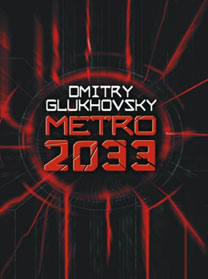"Metro 2033" - Gamers’ Harry Potter
 |
| Source: Amazon.com |
It’s no surprise that there is already a computer game of “Metro 2033.” Dmitry Glukhovsky’s dystopian novel, with its episodic shoot-outs and faceless mutant enemies, sometimes feels more like the product of an X-Box joystick than a literary imagination. But this post-apocalyptic, underground adventure, set in the disused tunnels of Moscow’s famous metro, also mixes action with occasional bouts of philosophy to keep more reflective readers happy.
Twenty-year-old Artyom, whose quest to reach the legendary Polis is the creaking mainspring of the Odyssean plot, reacts to his experiences along the way. In the subterranean nightmare that now passes for existence, bullets have become the main currency; Artyom wonders if Kalashnikov was really proud of his invention, rather than driven mad by the ensuing carnage. Artyom falls in with a group of Jehovah’s witnesses and, instead of being converted, becomes even more convinced that life is chaos.
Dmitry Glukhovsky spent many years as a journalist. The novel, “Metro 2033,” started life online in 2002. It has since had phenomenal Internet popularity. It has also been a huge commercial success, but only recently made it into paperback in English.
Natasha Randall, who has translated literary greats like Lermontov and Zamyatin, handles the crucial changes of register well. One of the more chilling moments involves Artyom’s temporary companion, Bourbon, suddenly switching from his usual casual speech (“you couldn’t see for shit”, “it’s full of garbage”) to halting proclamations: “the great darkness… shrouds the world and it will… dominate eternally.” Despite this stylistic control, there is often something a little stilted about the dialogues. Like many Russian books in translation, “Metro 2033” has inconsistencies of transliteration, especially in rendering of metro names and lines, but these may bother only fellow metro nerds.
There are parallels with Sergei Lukyanenko’s blockbuster “Night Watch” series, where the forces of light and dark do battle in the streets of Moscow. Glukhovsky also explores distinctively Russian extremes: corruption is still rife; faith and superstition coexist with atheism.
There are also moments when “Metro 2033” reads like an underground Harry Potter, as the young, orphaned hero is flung semi-willingly from encounter to encounter. The hypnotic sound of dead voices in the pipe system is reminiscent of the basilisk’s menacing hiss in the “Chamber of Secrets.” The comparison actually highlights Metro 2033’s weaknesses of style and structure. There is little of Rowling’s flair for characterization or engaging sense of purpose, and female characters are virtually non-existent. Ultimately, Glukhovsky’s novel struggles to rise above its aimless format, despite moments of poignancy. Its success must surely lie in its appeal for serious gamers. Yet when a book has this many fans, any critic who cannot see its charm is clearly missing something.
“Metro 2033,” Dmitry Glukhovsky, Orion Publishers
Read more: The best of Russian dystopia
All rights reserved by Rossiyskaya Gazeta.
Subscribe
to our newsletter!
Get the week's best stories straight to your inbox